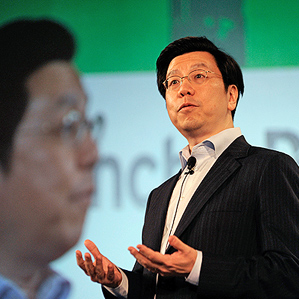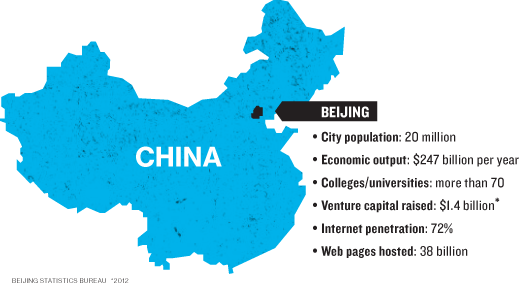Beijing’s Great Leap Forward(麻省理工发表了关于北京成为下一个硅谷的文章,而李开复被誉为创新潮流的领袖)
Kai-Fu Lee trained an army of Chinese engineers at Microsoft and Google. Now they’re turning Beijing into a technology powerhouse.

Cities all over the world have tried to duplicate Silicon Valley’s prowess at churning out startups and multibillion-dollar technology companies. But only one has emerged as a serious contender: Beijing.
China’s political, financial, and cultural capital has been on a startup tear in recent years. In 2011, Chinese venture capital firms invested $13 billion, half as much as their U.S. counterparts—30 percent of it in Beijing. (The total investment dipped sharply in 2012 in the face of a national economic slowdown.) Beijing hosts rare concentrations of wealth and 68 institutions of higher learning, including China’s best computer science departments. Like New York, it’s a magnet for ambitious young people. And like Washington, DC, it’s the center of the national government. Being close to government offices can be helpful in managing media businesses that must pass muster with government censors (see “China’s Internet Paradox”). And Beijing produces what few other places can—giant, fast-growing tech companies, like Baidu (now worth $31 billion) and smartphone maker Xiaomi, which sold $2 billion in handsets last year.
Among the city’s more than 20 million residents, few have played a bigger role in Beijing’s transformation from backwater to startup factory than Kai-Fu Lee. As the founder of Microsoft Research Asia and Google China, the U.S.-educated computer scientist not only became one of China’s first tech celebrities but personally trained a generation of engineers whose business ventures have turned Beijing into a dynamic technology center. More recently, Lee foundedInnovation Works, a Beijing-based incubator and venture capital firm dedicated to nurturing Chinese startups.
Beijing now is not just competent in software and gadgets. It has its own brands that are bound to lead in their own directions. It’s not inconceivable that one day Beijing will sit on top of the innovation pyramid alongside Silicon Valley, each producing global companies and creating new industries. “I’ve seen startup clusters all over the world,” says Steve Blank, an entrepreneur and business school professor who recently returned from a visit to China. “But Beijing blew me way. They’ve built an ecosystem on a scale that puts Boston or Seattle to shame. Beijing compressed 30 years of startup learning into five years.”
Lee, who is 51, isn’t from Beijing originally. He was born in Taiwan and moved with his family to the U.S. in 1973. As a PhD candidate at Carnegie Mellon University, in Pittsburgh, he was struck by the yawning technological gap between the U.S. and China. While he wrote, tested, and debugged his code at a computer terminal, a classmate from the People’s Republic executed those tasks on paper. “That opened my eyes about the backwardness of Chinese computing in general, not to mention innovation,” Lee says. The student “turned out to be a good programmer even though he did it on paper.” People in China, he felt, needed leadership and technical resources to surmount their impoverished environment.
By then, China’s government had set in motion ambitious plans to break into high-tech and electronics manufacturing. In the 1980s it opened the Zhongguancun technology hub in Beijing (now home to Lenovo), the first of 54 similar science and innovation parks that took Silicon Valley as their inspiration.
Lee’s chance to help came in 1997, after Bill Gates visited China and decided to gain a stronger Asian foothold for Microsoft’s products. The following year, Gates sent Lee to Beijing to launch what became Microsoft Research Asia (see “The World’s Hottest Computer Lab”).

Lee, by then a veteran of Silicon Graphics and Apple, quickly realized that given the lack of experienced managers and the authoritarian bent of Chinese society, he needed to organize teams of “soldiers” directed by a single “general” rather than follow the
every-man-for-himself approach typical of U.S. labs. “I had one general leading 10 soldiers, and the soldiers were so grateful and dedicated, they’d work nights and weekends,” he recalls.
Under Lee, Microsoft’s platoons learned how to focus on an engineering problem and produce a creative solution, China-style. And by the time Google recruited him in 2005 to establish Google China, government initiatives to promote technology education were bearing fruit. “I saw a dramatic improvement from programming on paper to dozens of hirable engineers to thousands,” he says.
Many of Lee’s generals, trained in producing software for big companies, took their experiences to Beijing startups, helped create giants like Tencent, as well as up-and-coming Beijing firms such as e-commerce specialist LightInTheBox and smartphone maker Xiaomi, whose cofounder Lin Bin had followed Lee from Microsoft to Google. These firms have a clear view of the Chinese market and can navigate policies that have made it difficult for some U.S. firms to do business (Google moved its search engine to Hong Kong in 2010).
Meanwhile, Chinese society has begun another shift. Before Microsoft and Google arrived, being the founder of a technology startup was not a socially acceptable career path. Parents pushed young people to find a job with an established company (and to a large extent they still do). But these days, there’s a popular reality TV show on which entrepreneurs pitch angel investors for seed funding. “I can’t overstate the importance of that,” says William Bao Bean, managing director at SingTel Innov8, a venture capital firm. “The entrepreneurs are driven; they want to start up. But the people around them needed that education.”
From a U.S. perspective, China’s Internet successes have been viewed as clones of foreign products. Tencent openly copied the ICQ chat client. Baidu imitated eBay. Yet to call these duplicates would miss an essential point. Each of these creations triumphed in what is now the world’s largest Internet market. By Kai-Fu Lee’s count, for instance, Groupon spawned 6,500 Chinese imitators, of which only a few survive. “Where else can you try something like that?” asks David Lin, Microsoft Ventures’ director for greater China. “The market scale can afford this kind of rapid experimentation, and the best prevail.”
The urge to replicate existing products is also receding as Chinese startups learn how to home in on customer needs and, in many cases, consciously adopt what are known in Silicon Valley as “lean startup” practices. In Lee’s view, these tenets—proactive market research, minimal features, rigorous measurement, rapid iteration—are perfectly suited to the Chinese character. “The lean startup model,” he says, “takes full advantage of the traits of Chinese people: hardworking, dedicated, focused, led by one person with a strong direction.”
At Innovation Works, his current venture, Lee is using those principles to provide what is, in China, a rare degree of support for experimentation and failure. And he’s aiming specifically to nurture entrepreneurs who haven’t set foot outside China. The $500 million investment fund and incubator has the backing of investors including YouTube founder Steve Chen and Foxconn, manufacturer of the Apple iPhone. Among the higher-profile investments have been DianDian, a “light blogging” platform that calls to mind Tumblr, and PaPa, a photo-sharing network. Both companies were started by Xu “Jack” Chaojun, a mainland entrepreneur who has never worked or studied overseas.
Xu represents a new generation for whom experience abroad is proving less important than direct experience serving Chinese customers. “A mainland engineer who spends too much time in the U.S. can lose touch with how Chinese users behave,” says Hans Tung, managing partner at Qiming Venture Partners. “The skill set is transferrable, but we’re dealing with dramatically different user behavior.”
The innovations currently coming out of Beijing are still limited in scope. They don’t threaten Silicon Valley’s monopoly on products so fresh and powerful that few customers would think to ask for them—items like the personal computer or Google Glass. Lee doubts Chinese entrepreneurs are likely to produce things like that anytime soon. For one thing, they have their hands full serving the Chinese Internet market (the world’s largest, with some 560 million users). Moreover, it will be some time before they’re consistently able to crack markets where Chinese isn’t the dominant language. “It’s not just China,” he notes. “It’s not clear that any country other than the U.S. can come out with so many disruptive innovations at scale.”
But things change quickly in Beijing. So quickly, in fact, that Lee thinks entrepreneurs there might eventually challenge those in the United States as innovation leaders. “The pace is faster here,” Lee says. “Companies iterate, build things, and grow faster than their U.S. counterparts. So it’s possible that new ideas will arise in China and be ready for the world before any U.S. company is even doing that thing. It’s an exciting opportunity.”




 浙公网安备 33010602011771号
浙公网安备 33010602011771号